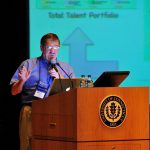A team of Neag School of Education researchers is developing a new initiative designed to help educators overcome language barriers to identify gifted students among English learners.
Finding Gifted Learners Through Language Barriers
October 5, 2022
October 5, 2022
A team of Neag School of Education researchers is developing a new initiative designed to help educators overcome language barriers to identify gifted students among English learners.
October 14, 2021
“Dr. Renzulli’s lifetime of pioneering research has led to substantial, positive changes in the theory and practice of pedagogy for all.” Mensa Foundation President Charlie Steinhice said. “But what impresses me the most is his dedication to putting those ideas into action, especially for low-income students with high potential.”

October 27, 2020
Joseph Renzulli served as founding director of the Neag Center, the Lynn and Ray Neag Endowed Chair for Talent Development, as well as the first director of the National Research Center on the Gifted and Talented (NRC/GT), then one of a dozen centers in the U.S. focused on addressing significant issues in the education of gifted and talented students, and enrichment education. Under Renzulli’s guidance, the Neag Center evolved into one of the leading centers in gifted education and talent development in the world.
October 15, 2020
On September 22, the Duke University Talent Identification Program (Duke TIP) welcomed Dr. Del Siegle, who is a professor in the University of Connecticut’s Neag School of Education and the director of the National Center for Research on Gifted Education (NCRGE), to deliver a presentation entitled “Report from the NCRGE: Problems and Promising Practices in Gifted Education.”

April 22, 2019
“Teachers and educators are not super supportive of acceleration,” said Betsy McCoach, one of the researchers and a professor at the University of Connecticut. “But it doesn’t make sense to pull kids together to do the same thing that everyone else is doing.”
April 16, 2019
“Unfortunately, many of our nation’s brightest students from underserved populations (e.g., Black, Hispanic, English Learner, and/or free and reduced-price lunch eligible) are not being identified as gifted and do not receive gifted education services,” says Del Siegle, principal investigator with the National Center for Research on Gifted Education and an associate dean with the Neag School. “About 80% of states that completed the most recent National Association for Gifted Children’s State of the States survey indicated that underrepresentation of students from underserved populations was an important or very important issue in their state.”
April 15, 2019
“Teachers and educators are not super supportive of acceleration,” said Betsy McCoach, one of the researchers and a professor at the University of Connecticut. “But it doesn’t make sense to pull kids together to do the same thing that everyone else is doing.”
January 13, 2015
Chosen through a competitive selection process and authorized by the U.S. Congress-revitalized Jacob K. Javits Gifted and Talented Students Education Act, the National Center for Research on Gifted Education (NCRGE) at UConn was established with a $2 million grant from the federal Department of Education’s Institute of Educational Sciences to be used over the next two years.